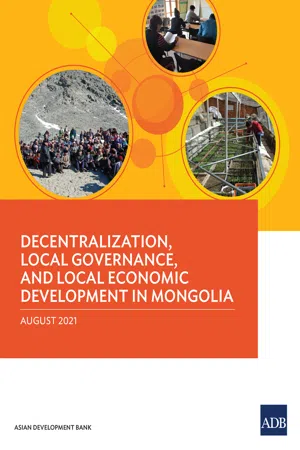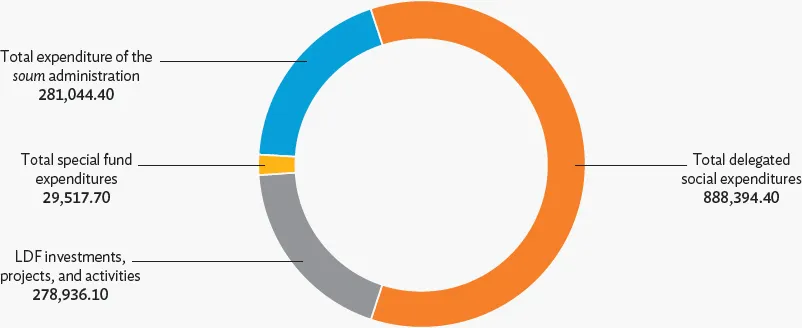
- 92 pages
- English
- ePUB (mobile friendly)
- Available on iOS & Android
eBook - ePub
About this book
This publication presents an empirical assessment of Mongolia's system of decentralized governance and the extent to which it translates into the actual and practical working environment for subnational and local governments. It focuses on the roles of subnational and local governments in providing public services and promoting local economic development.
Frequently asked questions
Yes, you can cancel anytime from the Subscription tab in your account settings on the Perlego website. Your subscription will stay active until the end of your current billing period. Learn how to cancel your subscription.
No, books cannot be downloaded as external files, such as PDFs, for use outside of Perlego. However, you can download books within the Perlego app for offline reading on mobile or tablet. Learn more here.
Perlego offers two plans: Essential and Complete
- Essential is ideal for learners and professionals who enjoy exploring a wide range of subjects. Access the Essential Library with 800,000+ trusted titles and best-sellers across business, personal growth, and the humanities. Includes unlimited reading time and Standard Read Aloud voice.
- Complete: Perfect for advanced learners and researchers needing full, unrestricted access. Unlock 1.4M+ books across hundreds of subjects, including academic and specialized titles. The Complete Plan also includes advanced features like Premium Read Aloud and Research Assistant.
We are an online textbook subscription service, where you can get access to an entire online library for less than the price of a single book per month. With over 1 million books across 1000+ topics, we’ve got you covered! Learn more here.
Look out for the read-aloud symbol on your next book to see if you can listen to it. The read-aloud tool reads text aloud for you, highlighting the text as it is being read. You can pause it, speed it up and slow it down. Learn more here.
Yes! You can use the Perlego app on both iOS or Android devices to read anytime, anywhere — even offline. Perfect for commutes or when you’re on the go.
Please note we cannot support devices running on iOS 13 and Android 7 or earlier. Learn more about using the app.
Please note we cannot support devices running on iOS 13 and Android 7 or earlier. Learn more about using the app.
Yes, you can access Decentralization, Local Governance, and Local Economic Development in Mongolia by in PDF and/or ePUB format, as well as other popular books in Law & Public Law. We have over one million books available in our catalogue for you to explore.
Information
SUBNATIONAL GOVERNANCE AND SERVICE DELIVERY IN PRACTICE
This section explores how SNGs manage their primary levers of local public action, the delivery of the range of socioeconomic infrastructure and services for which they are responsible, and the constraints and issues that surround this.
A. Service Delivery Spending Responsibilities
1. Legal Mandates
Since 2012, there has been a degree of expenditure responsibility assigned to SNGs under the Budget Law (2012):
(i)Under Article 58, there is a set of modest, devolved service delivery functions of aimags and soums.
(ii)Under Articles 39.1 and 61.1, there is delegation of responsibilities for basic education, primary health care, social welfare, physical fitness, and culture to SNGs. These are funded through special-purpose fiscal transfers. In the most recent Budget Law revision, from 2019 some minor spending functions related to physical fitness, culture, and parts of school and clinic operating budgets will no longer be transferred to SNGs as devolved functions and funded from the base expenditure budget (Table 4).
Table 4: Functions Decentralized under the Budget Law
Sector | Aimags and Capital City | Soums and Districts |
Main Functions Devolved (Budget Law, Article 58) | ||
Social Welfare | • Social care and welfare (upon a decision of SNG governors) • Playgrounds | • Social care and welfare (upon a decision of SNG governors) • Playgrounds |
Transport, Roads | • Public transport • Aimag and Inter-soum roads • Street lighting | • Street lighting maintenance |
Water and Sanitation | • Water supply • Sewerage, drainage • Waste removal • Public hygiene | • Public hygiene, street cleaning, waste removal |
Agriculture and Livestock | • Livestock restocking • Pasture management • Pest control | • Livestock restocking • Pasture management |
Economic Development | • O&M electric distribution network • Development of small and medium-sized enterprises | |
Environment | • Environmental protection and rehabilitation • Flood protection | • Environmental protection |
Capital Infrastructure | • Urban planning, construction of new infrastructure • Maintenance of locally owned buildings | |
Main functions delegated (Budget Law, Articles 39.1 and 61.1) | ||
Education | • Preschool, general education, fitness, and culture | • Preschool, general education, fitness, and culture |
Health | • Primary health care | • Primary health care |
Social Welfare | • Child protection and development | • Child protection and development |
O&M = operation and maintenance, SNG = subnational government.
Source: Asian Development Bank (compiled from the Budget Law of Mongolia, 2010).
However, these are recurrent budget responsibilities for which all local spending is subject to rigid central budget norms, greatly limiting any local choice.
Despite the provisions noted in Table 4, in practice, capital budget spending is still controlled by the central sector ministries. The main resource for local capital budget spending is the LDF transfer and for which there are menus for aimags and soums, although these are not always clear. For example, it is not clear if these menus are exclusive mandates for spending only to be undertaken by SNGs or permissive lists of allowable spending that the central government may decide to spend.
A review process of SNG functional assignments has been launched by the Cabinet Secretariat under the SDC-supported Decentralisation Policy Support Program. A methodology has been developed with initial piloting undertaken in the Ministry of Environment, which is now being extended to the Ministry of Construction and Urban Development and the Ministry of Labour. The next step will be to assess SNG capacity to adopt new functions.
The Cabinet Secretariat officially endorsed this methodology in a January 2018 circular to all ministries. The recent Budget Law revision included a provision under Article 58 that each ministry should review SNG assignments every 3 to 5 years. However, based on international experience, it remains to be seen how enthusiastically line ministries will move to cede to SNGs any control over their responsibilities and the associated budgetary and staff resources.
The Budget Law is not the only statute mandating functions to SNGs. Functions are scattered throughout other laws and regulations and not always aligned or updated and constitute a source of some confusion (Box 10).
Box 10: Unclear Mandates to Subnational Governments
In 2014, Ulaanbaatar City authorities undertook an extensive review of service delivery functions, roles, and procedures as laid down under the law. The findings were revealing.
(i)A large number of legal and regulatory instruments (137) in one way or another dictate service responsibilities to city authorities at one level or another.
(ii)A large number of service delivery responsibilities (536) are mandated to city, district, and khoroo (urban ward) authorities. For example:
• roads and related infrastructure maintenance: 34 responsibilities
• social policy: 75 responsibilities
• social protection and welfare: 122 responsibilities
• public order: 23 responsibilities
• environment: 29 responsibilities
(iii)A large degree of confusion existed across this range of responsibilities. Among the 536 distinct service responsibilities, there were 147 overlaps or conflicts in mandated responsibilities between city and districts, or districts and khoroos.
A similar review conducted by another aimag (province) counted 80 sector-specific laws or regulations that in different ways specify subnational government service delivery responsibilities.
Source: Consultations with Ulaanbaatar City officials.
2. Spending Patterns in Practice
Overall, subnational spending in 2017 constituted 26% of all national government spending, down from 29% in 2014 (Figure 3).
No national budget data on SNG spending by sector were available other than for Ulaanbaatar (Appendix 1). Based on field visits, it appears that the bulk of this spending is on the functions delegated to SNGs under Articles 39 and 61 (education, health, and social welfare), accounting for 60% of the budget. Most SNG revenues compri...
Table of contents
- Front Cover
- Title Page
- Copyright Page
- Contents
- Tables, Figures, and Boxes
- Acknowledgments
- Abbreviations
- Glossary
- Synopsis
- Subnational Governance in Mongolia: Institutional and Policy Context
- Subnational Governance and Service Delivery in Practice
- Broader Subnational Government Roles in Local Development
- Conclusions and Future Directions
- Appendixes
- Footnotes
- Back Cover
